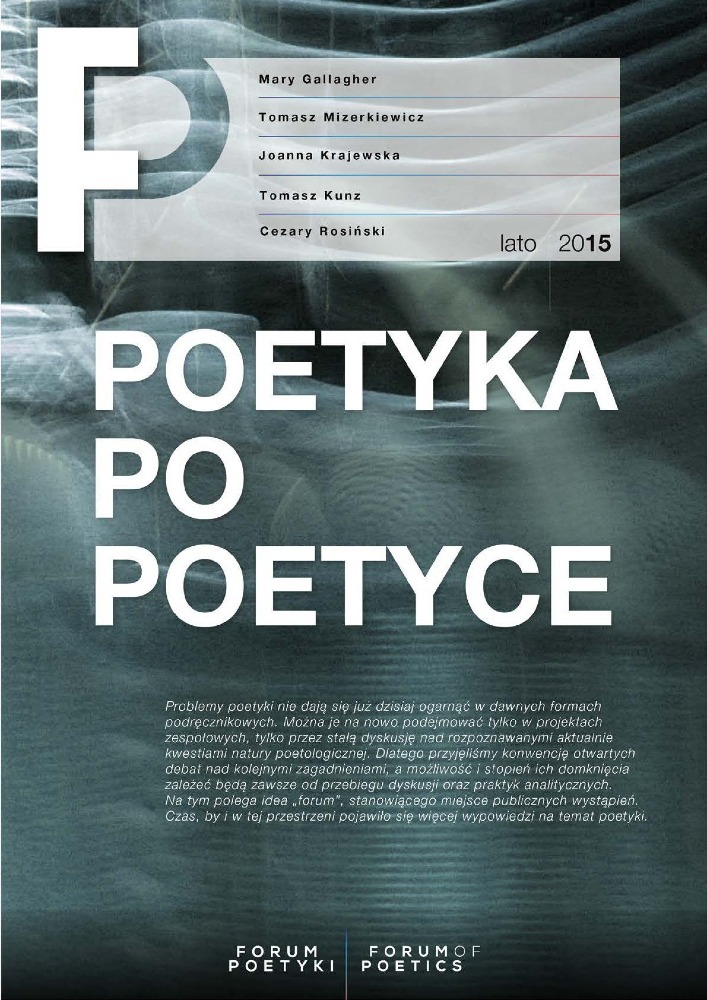Abstrakt
Artykuł pokazuje najważniejsze skutki procesu demontażu metodologicznych i epistemologicznych podstaw nowoczesnej teorii literatury, który w polskim literaturoznawstwie przybrał postać skokowej i często dość powierzchownej asymilacji radykalnych wniosków płynących z dwóch zwrotów metodologicznych – poststrukturalnego i kulturowego. Jedną z najpoważniejszych konsekwencji owego procesu było nazbyt łatwe wyrzeczenie się przez literaturoznawstwo odrębności własnego przedmiotu i własnej metodologii badawczej, będące konsekwencją kulturowej reorientacji studiów literackich. Doprowadziło to do zastąpienia teorii literatury przez ogólną teorię kultury i uczynienia z tekstu literackiego zaledwie jednego z wielu równoprawnych przedmiotów kulturotwórczej praktyki. Na tle nowoczesnej teorii literatury, która posiada już dzisiaj wyłącznie charakter historyczny, poetyka okazuje się dyscypliną nie tylko żywotną i ekspansywną (o czym świadczy wykorzystywanie przez inne dziedziny wiedzy wypracowanych przez nią pojęć i kategorii), ale także nieodzowną dla dalszego trwania kulturowo zorientowanych studiów literacki. Tylko ona bowiem dostarcza narzędzi pozwalających skutecznie argumentować na rzecz odrębności i specyfiki literatury jako pod wieloma względami uprzywilejowanej formy poznania i ekspresji kulturowego doświadczenia człowieka, wyróżniającej się szczególnymi właściwościami formalnymi i semantycznymi, czyniącymi z niej jedyny w swoim rodzaju kod międzyludzkiej komunikacji.
Bibliografia
Brooks, Peter. „Aesthetics and Ideology: What Happened to Poetics?” Critical Inquiry 20, nr 3 (1994).
Burzyńska, Anna. Anty-teoria literatury. Kraków: Universitas, 2006.
Czermińska, Małgorzata, red. Polonistyka w przebudowie: literaturoznawstwo - wiedza o języku - wiedza o kulturze - edukacja : Zjazd Polonistów, Kraków, 22-25 września 2004. Kraków: Towarzystwo Autorów i Wydawców Prac Naukowych Universitas, 2005.
Głowiński, Michał, i Ryszard Nycz. Dzieło wobec odbiorcy: szkice z komunikacji literackiej. Kraków: Towarzystwo Autorów i Wydawców Prac Naukowych „Universitas”, 1998.
Knapp, Steven, i Walter Benn Michaels. „Against Theory”. Critical Inquiry 8, nr 4 (1982).
Kola, Adam F. „Języki teorii - języki poetyki: o zmianie paradygmatu, która wciąż czeka na dopełnienie”. Tekstualia. 2013, nr 4 (2013): 93–104.
Markowski, Michał Paweł. „Interpretacja i literatura”. Teksty Drugie : teoria literatury, krytyka, interpretacja. 2001, nr 5 (2001): 51–66.
Markowski, Michał Paweł. Polityka wrażliwości: wprowadzenie do humanistyki. Kraków: TAiWPN „Universitas”, 2013.
Seamon, Roger. „Poetics against Itself: On the Self-Destruction of Modern Scientific Criticism”. PMLA PMLA 104, nr 3 (1989): 294.
Sławiński, Janusz. Miejsce interpretacji. Gdańsk: Słowo/Obraz Terytoria, 2006.
Szahaj, Andrzej. „Sławiński o interpretacji: analiza krytyczna”. Teksty Drugie. 2013, nr 5 (2013): 259–75.
Tikhanov, Galin. „Dlaczego nowoczesna teoria literatury narodziła się w Europie Środkowej i Wschodniej?: (i dlaczego dziś jest martwa?)”. Przetłumaczone przez Marcin Adamiak. Teksty Drugie : teoria literatury, krytyka, interpretacja. 2007, nr 4 (2007): 131–52.
Todorov, Tzvetan. Poetyka. Przetłumaczone przez Maria Renata Mayenowa. Warszawa: Wiedza Powszechna, 1984
Licencja
Za prawa cytowania fragmentów innych publikacji (tekstów, tabel, rycin oraz ilustracji) odpowiedzialni są autorzy artykułu.

